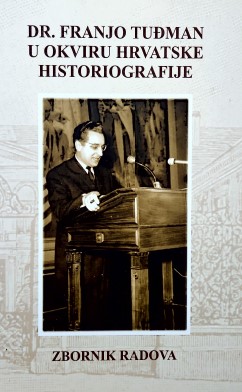POVJESNIČARI KOJI PRORIČU UNATRAG I POVJESNIČARI KOJI PIŠU BUDUĆU POVIJEST
HISTORIANS WHO FORETELL BACKWARDS AND HISTORIANS WHO WRITE FUTURE HISTORY
Author(s): Miroslav Tuđman
Subject(s): Political history, Methodology and research technology, Historical revisionism
Published by: Hrvatski institut za povijest
Keywords: historical knowledge; historical science; historians; political paradigm; end of history; revisionists; Croatia; nation; international order;
Summary/Abstract: The answer to the question about the perception of the nature and the role of historical knowledge and historical science explains how historian Franjo Tuđman, previously in complete isolation, was able to take the helm of his party and his country in a matter of one year (1989/1990) and to attain the goal that generations before him had striven to, but never managed to achieve. The answer to this question also shows how important the knowledge of history had been for the establishment of the independent Croatian state and for the running of state politics, and which knowledge specifically had played the vital role. The paper analyzes the patterns according to which public and historical knowledge is organized and formed. The crucial aspect for the functioning of the dominant political paradigm that shapes the public knowledge is that it will not admit to the existence and functioning of anomalies and irregularities, nor will it discuss them. If the political elite in power were capable of dealing with the anomalies it produced and the irregularities it was faced with, they would discuss the essence of the problem. However, unwilling to discuss the essence of the problem, the dominant dogma attempts to eliminate its opponents, the so-called «revisionists», from the public life using a variety of methods and techniques of propaganda and information war, as well as criminal persecution and physical elimination. An analysis of the political elements of «sloppy science» and the political fates of the «revisionists» and their writings yields two completely opposite approaches to the research of historical events and two opposite understandings of the purpose of historical research and the task of historical knowledge. These differences in the methodology of historical research change not only the subject of the research, but also the nature of historical knowledge. The historians who look into the past while anchored firmly in the present see the past, the present, and the future as the only possible, logical, and regular sequence of events. They normally define history as a sequence of events that hardly could have resulted in a different outcome. The protagonists of these events who had not managed to fulfill their potentials are seen as irrelevant persons with subordinate roles in history.
- Page Range: 59-77
- Page Count: 19
- Publication Year: 2011
- Language: Croatian
- Content File-PDF

